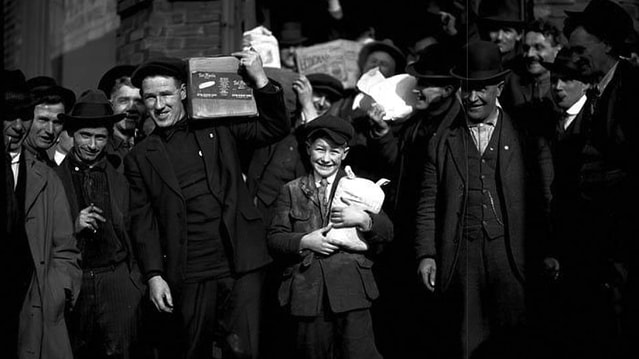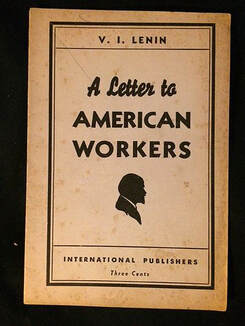|
A group of men and a boy carrying groceries during the Seattle general strike, February 7, 1919. | Museum of History and Industry, Seattle. The Centennial of the Russian Revolution November 7, 2017 marks the 100th anniversary of the Russian Revolution and the establishment of the world’s first socialist state. To commemorate the occasion, People’s World presents a series of articles providing wide-angled assessments of the revolution’s legacy, the Soviet Union and world communist movement which were born out of it, and the revolution’s relevance to radical politics today. Other articles in the series can be read here. Just before Christmas, on December 21, 1917, a strange freighter pulled into Elliott Bay in Seattle. This vessel bore an unfamiliar flag—a red flag. This was a Russian ship, the Shilka, out of Vladivostok, Russia. Only a few weeks before, on November 7, a Bolshevik revolution had taken place in Russia and its leader, Vladimir Lenin, proclaimed a workers’ and farmers’ state. The Seattle city fathers were disturbed by this sight. After all, they had just gone through a tumultuous lumber strike. Several local issues were stirring the AFL Central Labor Council. What was the purpose of this ship? Rumors circulated that it carried weapons and gold to foster a revolution in Seattle and the U.S. The U.S. had just entered WWI, the “Great War,” back in April, and patriotic fervor was at a high pitch. And the new revolutionary government had declared peace with our German enemy. This ship could be a potential threat. Given these fears, port authorities refused to allow the Shilka to land, and it sat stranded in the harbor. But the ever resourceful Bolshevik sailors managed to sneak ashore and make contact with the IWW and the labor movement. (Some of the socialist sailors had lived in the U.S. and spoke English.) Eventually, the ship docked at Pier 5. Rather than guns and gold, investigators found the cargo to be beans, peas, and licorice root—destined for Baltimore. And, oh yes, some suspicious Russian vodka laced with red peppers. By this time, of course, newspaper headlines around the country screamed about the “Bolshevik ship of mystery” and IWW plots. Socialist leader Eugene V. Debs commented, “Everything that happens nowadays that the ruling classes do not like is laid at the feet of the IWW.” Seattle’s socialist newspaper, the Socialist Daily Call, regularly carried articles about the Shilka by journalist Anna Louise Strong. Although the AFL Central Labor Council was critical of the IWW, the Seattle Union Record also expressed concern for the Russian sailors and how they were being treated. The Central Labor Council also drafted a letter to Russian workers expressing their fraternal greetings and best wishes to all who aspired to “establish a true and free industrial democracy” in Russia. The Tacoma IWW wrote a message cheering the revolution and declaring their support for a “worldwide industrial commonwealth based on the brotherhood of man.” Nicolai Kryukov, a Bolshevik from the sailor’s committee, met with IWW members a number of times and spoke at their meetings about the revolution and what it hoped to achieve. The members, probably led by lumberjack Roy Brown, wrote a congratulatory message to Russian workers: “To Nicholai Lenin and the Representatives of the Bolshevik Government and Through Them to the Workers of Russia.” The sailors carefully secreted the letter on their ship. As the ship left port on January 5, a crowd of over 200 well-wishers cheered. A band played La Marseillaise—one of the anthems of the Russian workers then. The sailors also carefully secreted messages from the IWW and the Seattle Central Labor Council, to be delivered in Vladivostok. Following the ship’s departure, there was a right-wing backlash in which the offices of the Socialist Daily Call were burned to the ground and several local radicals were arrested. The Shilka docked in Vladivostok, and the newspaper Red Banner printed the IWW letter on March 20, 1918. The message from the Seattle Central Labor Council had been entrusted to the non-Bolshevik captain, who apparently jumped ship during refueling in Japan. Nothing more was heard from him, and the letter was lost to history. In November 1920, Kryukov met Lenin at a conference. Lenin told him that he had read the letter and answered it. When he learned that Kryukov and his comrades had been on the ship, Lenin warmly embraced him. Lenin had written his reply on August 26, 1918. It was a very dark and dangerous time for the Russian Revolution. Armies from the U.S., Britain, France, and Japan had invaded Russia in an attempt to crush the revolution. Insurgent generals Kolchak, Wrangel, Denikin, Yudenich, and others initiated civil war aimed at restoring the Czarist autocracy. U.S. troops had landed in Murmansk and later, beginning in August 1918, in Vladivostok. By the end of September, there were 7,500 U.S. troops operating out of Vladivostok. About 3,000 Canadian and Australian troops were sent by Britain. Kolchak ran a hideously brutal “government” which appalled the allied troops. A Canadian soldier wrote, “However much one may deprecate the Bolshevik methods, we Canadians in Siberia could neither hear or see anything which inspire in us any confidence in the Kolchak government… There came to our ears stories of the workings of that government which savored more of Caesar Borgia that any democratic government.” The main contingent of troops in Siberia, however, came from Japan. Estimates of the Japanese forces ran as high as 70,000 troops. It became obvious that the Japanese were interested in reclaiming Siberian lands lost in previous wars with Russia. When the Germans signed the armistice ending WWI on November 11, 1918, U.S. and other occupying troops remained in Russia, not leaving until January 1920. The Japanese remained until 1922—and continued to occupy Sakhalin Island, which the Soviets recaptured in 1945. But what of Lenin’s letter to the American workers? A 1935 edition of Lenin’s “Letter to American Workers,” from International Publishers. What Lenin desperately needed was for U.S. troops to be removed from Siberia and for aid to counterrevolutionaries to be stopped. He recognized the importance of the U.S. in the Allied Coalition—and as a future trading partner. When Lenin finished his letter, the question became how to deliver it? Again, it was a Russian seaman who was called upon to sail to America and see that the letter was published. He was also given a secret letter to President Woodrow Wilson from Lenin, who called for peaceful and friendly relations. (Wilson never revealed the contents of this letter.) Lenin’s letter to American workers was handed to John Reed, who had just returned from Russia, and who set about getting the letter printed in socialist newspapers far and wide. So what did Lenin have to say in his Letter to American Workers? First, he sought to make connections between the American Revolution of 1776 and the Russian Revolution of 1917: “The history of modern, civilized America opened with one of those great, really liberating, really revolutionary wars of which there have been so few compared to the vast number of wars of conquest which, like the present imperialist war, were caused by squabbles among kings, landowners, or capitalists over the division of usurped lands or ill-gotten gains. That was the war the American people waged against the British robbers who oppressed America and held her in colonial slavery, in the same way as these “civilized” bloodsuckers are still oppressing and holding in colonial slavery hundreds of millions of people in India, Egypt, and all parts of the world.” Lenin also commented on the U.S. Civil War: “The American people have a revolutionary tradition which has been adopted by the best representatives of the American proletariat, who have repeatedly expressed their complete solidarity with us Bolsheviks. That tradition is the war of liberation against the British in the eighteenth century and the Civil War in the nineteenth century. In some respects, if we only take into consideration the ‘destruction’ of some branches of industry and of the national economy, America in 1870 was behind 1860. But what a pedant, what an idiot would anyone be to deny on these grounds the immense, world-historic, progressive and revolutionary significance of the American Civil War of 1863-65! “The representatives of the bourgeoisie understand that for the sake of overthrowing Negro slavery, of overthrowing the rule of the slave owners, it was worth letting the country go through long years of civil war, through the abysmal ruin, destruction, and terror that accompany every war. But now, when we are confronted with the vastly greater task of overthrowing capitalist wage-slavery, of overthrowing the rule of the bourgeoisie—now, the representatives and defenders of the bourgeoisie, and also the reformist socialists who have been frightened by the bourgeoisie and are shunning the revolution, cannot and do not want to understand that civil war is necessary and legitimate.” Pointing to the revolutionary and socialist traditions of American workers, he added: “The American workers will not follow the bourgeoisie. They will be with us, for civil war against the bourgeoisie. The whole history of the world and of the American labor movement strengthens my conviction that this is so. I also recall the words of one of the most beloved leaders of the American proletariat, Eugene Debs, who wrote in the Appeal to Reason, I believe towards the end of 1915, in the article, “What Shall I Fight For” (I quoted this article at the beginning of 1916 at a public meeting of workers in Berne, Switzerland)—that he, Debs, would rather be shot than vote credits for the present criminal and reactionary war; that he, Debs, knows of only one holy and, from the proletarian standpoint, legitimate war, namely: the war against the capitalists, the war to liberate mankind from wage-slavery.” Lenin knew, of course, that help was not on the way and that it would require a world-wide effort to guarantee the success of the Russian socialists: “We know that help from you will probably not come soon, comrade American workers, for the revolution is developing in different countries in different forms and at different tempos (and it cannot be otherwise). We know that although the European proletarian revolution has been maturing very rapidly lately, it may, after all, not flare up within the next few weeks. We are banking on the inevitability of the world revolution, but this does not mean that we are such fools as to bank on the revolution inevitably coming on a definite and early date. We have seen two great revolutions in our country, 1905 and 1917, and we know revolutions are not made to order, or by agreement. We know that circumstances brought our Russian detachment of the socialist proletariat to the fore not because of our merits, but because of the exceptional backwardness of Russia, and that before the world revolution breaks out a number of separate revolutions may be defeated.” Did Lenin’s article ever reach the Seattle workers? Did it somehow play a role in the General Strike of 1919? This is a yet-unsettled question, and we will leave it for another time—but one has hopes. This article is based on a paper presented at the Pacific Northwest Labor History Association conference in Vancouver, British Columbia. AuthorJames H. Williams is a retired professor and long-time labor and community activist living in Tacoma, Washington. This article was first published by People's World
0 Comments
Leave a Reply. |
Details
Archives
July 2024
Categories
All
|



 RSS Feed
RSS Feed